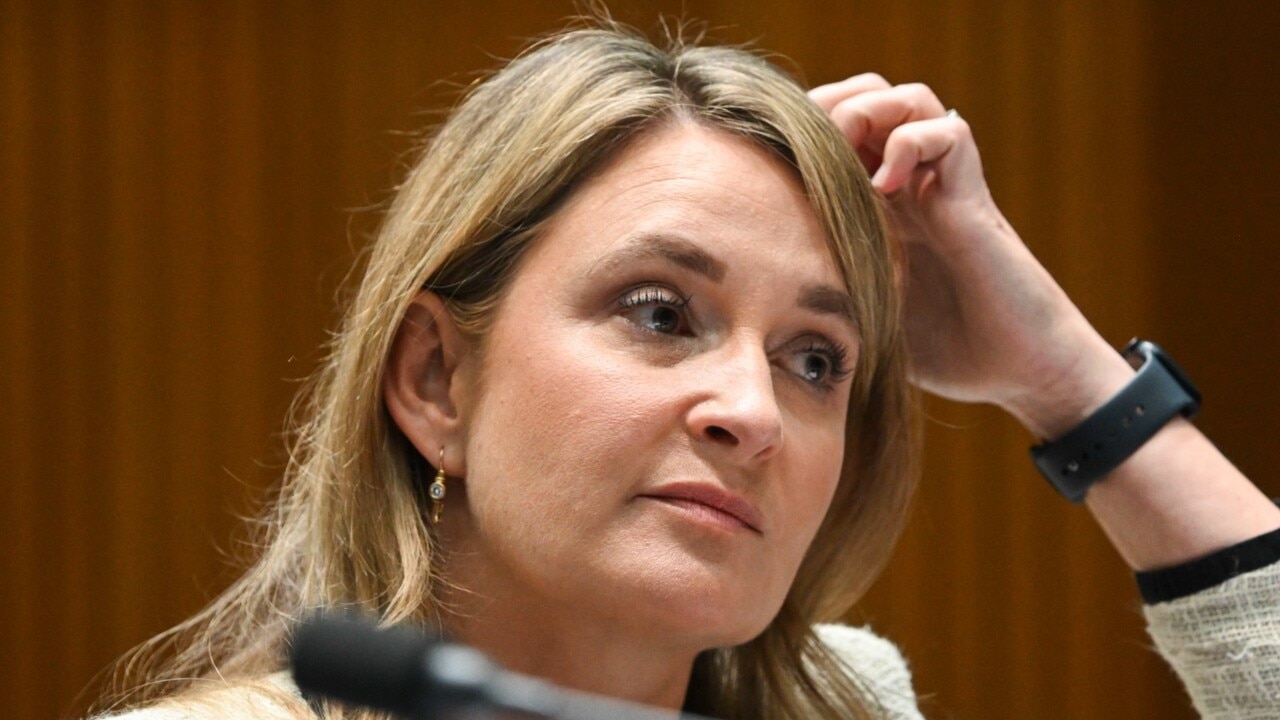Optus chief warns against seeking damages for losses and says roaming could bring down a rival
Optus chief Kelly Bayer Rosmarin has told a Senate inquiry seeking damages has much broader implications and says allowing customers to ‘roam’ could collapse a rival network.

Business
Don't miss out on the headlines from Business. Followed categories will be added to My News.
Optus chief executive Kelly Bayer Rosmarin has warned businesses to not seek damages for “consequential loss” over the collapse of the telco’s national network that sparked widespread economic chaos.
Some small businesses reportedly lost up to $10,000 during last Wednesday’s outage, which lasted 11 hours and crippled payment and booking systems as well as shut down Melbourne’s train network, the call centre of Australia’s biggest bank, CBA, and communications at some hospitals.
Under Australian consumer law, a telco must refund usage costs during an outage – not compensate for the losses stemming from being unable to access its services.
To this end, Optus has offered the equivalent of $100 worth of free data as it reels from its second reputational disaster in 13 months after last year’s cyber attack.
Ms Bayer Rosmarin – who is under pressure to resign – said if the telco refunded customers for services charged, it would equate to $1.60 based on its average monthly plan cost.
“Just refunding people for the day between $1 and $2 was not going to cut it. And that’s why we went further to offer those data offers to our customers,” Ms Bayer Rosmarin on Friday told a Senate inquiry into the outage.
The free data offer has been widely criticised but Ms Bayer Rosmarin said that seeking direct compensation would have “far reaching” consequences.
“I don’t like to use the word compensation because what we’re doing is assessing this specific scenario of that customer and trying to do the right thing by their customer who we want to have a long-term relationship with us,” she said.
“There is no precedent for telcos or other essential providers covering consequential loss, and we are very conscious that this would have far-reaching implications – not just for Optus, not just for all telcos including the NBN, but also for other essential services, utilities, government services.
“This needs to be a much broader conversation than us unilaterally determining how to go about that.”
Despite the warning, Optus has so far paid $36,000 in compensation claims and Ms Bayer Rosmarin said it faced a $430,000 bill.
“We’ve had 8500 customers and small businesses reach out so far. I don’t have any details into the veracity of those claims and what’s happening,” she said.
“What I am committed to, and what our teams are committed to, is to have a process to individually engage with each customer on their unique circumstances, to evaluate what’s the right thing to do for their customer and to work with those customers to help ensure that they’re set up well into the future.”
Ms Bayer Rosmarin’s compensation estimates contrast with a calculation by Pan-Asian bank Maybank that damages costs could be up to $400m. It based that assessment on an outage which hit Telstra in 2016. During that shutdown, Telstra issued a $25 credit for consumers and $50 credit for businesses.
Maybank expects Optus to lose customers to Telstra and smaller rival TPG Telecom as a result of the outage.
Telstra chief executive Vicki Brady has confirmed her telco has already signed on Optus customers.
“Post last week’s outage, yes, we’ve seen some increase in acquisition of customers,” Ms Brady said.
“There’s been some speculation about how large that could be, and I would just go back to the cyber breach last year … we saw elevated acquisition levels for around a six-week period.”
Ms Bayer Rosmarin said Optus had taken steps to ensure such an outage did not happen again, but dismissed the option of automatic roaming, saying that if that happened it would have “overwhelmed and congested and brought down” a rival’s network.
“At the moment we have about 30 per cent market share; let’s say hypothetically that there was a fault on Telstra’s network where they have 50 per cent market share and suddenly all of those subscribers were to be on our network,” she said.
“We would have to have already invested in the capacity to be able to cater for that many customers simultaneously.
“So there are a lot of considerations if we go down this path about investment capacity and how that all works to make sure that you don’t, inadvertently, if one goes down bring down another network well.”
Ms Bayer Rosmarin said Optus was not putting its earnings – which dived 13.9 per cent to $141m in the half year to September 30 – ahead of customers’ interests.
“We don’t see profits and customers as opposed in any way,” she said.
“We only make a profit if we have happy customers and more customers choose us, and more customers choose to stay with us.
“So for us to be profitable, we want to do the right thing for customers.”
Originally published as Optus chief warns against seeking damages for losses and says roaming could bring down a rival





